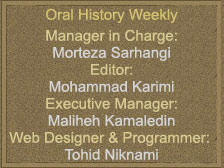| No. 231 | 13 December 2015 |
Military service at the beginning of the 1950s (1)I did not dare to say I fastInterview with Haji Mohammad Hashem SoleimaniI had heard that Haji Mohammad Hashim Soleimani has served his soldiering in Pahlavi’s palaces between the years 1331 to 1333 (1952-1954). On a snowy day in the fall of 1394 (2015), I set off to Chonas village in Arak. Mr. Soleimani’s job was farming. And although he was born in 1312 (1933), but still speaks about some events of his twenties precisely and warmly. It has passed more than 63 years since that time, but he speaks as if it happened yesterday.Susangerd, Occupation, Liberation (2)An interview with Ghodratollah BahariI visited Colonel Ghasemi, commander of Ahvaz army, and introduced myself. I knew him before. He was commander of Battalion 255-Tank in which I had been trained M36 and M4 tanks. He was familiar with my spirit. He didn’t know my other past records, but had known with my spirit from that time I was in battalion for training. “Ghodrat! What are you doing here?” he called my name, “did you escape to Tehran?” I said: “Yes, but I was a volunteer.”He, his friends: Mine and MoonlightIn Ali Khoshlafz’s memories, When Moonlight was lostSomeone asked:”Does the first manuscript in the book really belong to narrator?” Sometimes later the narrator said: ”When I want to write a letter, I ask my wife to do the job for me, the book’s manuscript belongs to my wife.”Book manifests Ashura mourning in captivity during imposed warMuharram and Ashura mourning held by the Iranian combatants in captivity during the imposed war of Iraq against Iran is manifested in the book “The leg which Left behind” by Seyyed Nasser Hosseinipour.According to IBNA correspondent, the Sacred Defense is associated with the culture of Ashura. Black-clad warriors with tents and trenches in the first ten days of Muharram tried to keep the memory of friends and the glory of the rising of Imam Hussein (AS) alive in their hearts and stand against the enemy under the influence of that culture. IBNA has reviewed the Muharram in front lines through the lines written in the book ‘The leg left behind’. Oral History Weekly Magazine Aims and Regulations
Oral History Weekly Magazine wishes to create a suitable place for thoughts and idea development; Its main field would be “Oral History” and subjects as telling & writing memoirs, writing diaries, travelogues, chronologies, and all other subfields of history which are presented in the form of news, articles, reports, notes, interviews and memoirs can be included. There is no limitation on the length of would-be-sent materials. Mentioning the name, academic background and email is necessary. Articles with complete references and bibliography are more credited and an abstract would quite helpful. Weekly is not about to publish any material consisting insults and libels about other people or anything that brings anxiety to public opinion. Weekly can edit and translate the received materials. The published articles and materials are only the writer’s ideas and Oral History Weekly Magazine has no responsibility about their content. |
 Daughter of Sheena-60 Memories of Qadamkheyr Mohammadi Kanaan Wife of Sardar Shaheed Haj Sattar Ebrahimi Hajir Memory writer: Behnaz Zarrabizadeh Tehran, Sooreh Mehr Publications Company, 2011 (Persian Version) Translated by Zahra Hosseinian
I came back home. My brother was not with children. He went to the other room and sat next to my father-in-law, talking together in a low voice. They stopped talking as soon as saw me. My anxiety increased. “Why haven’t you still slept?” I said, “What’s wrong? If there is anything I should know, please tell me. I’m very worried.” My father-in-law again lay down in his bed and said: “No, my daughter-in-law, there’s nothing. We are speaking about manly and family things. What is supposed to happen? If there was anything, we surly said it to you.”    |
